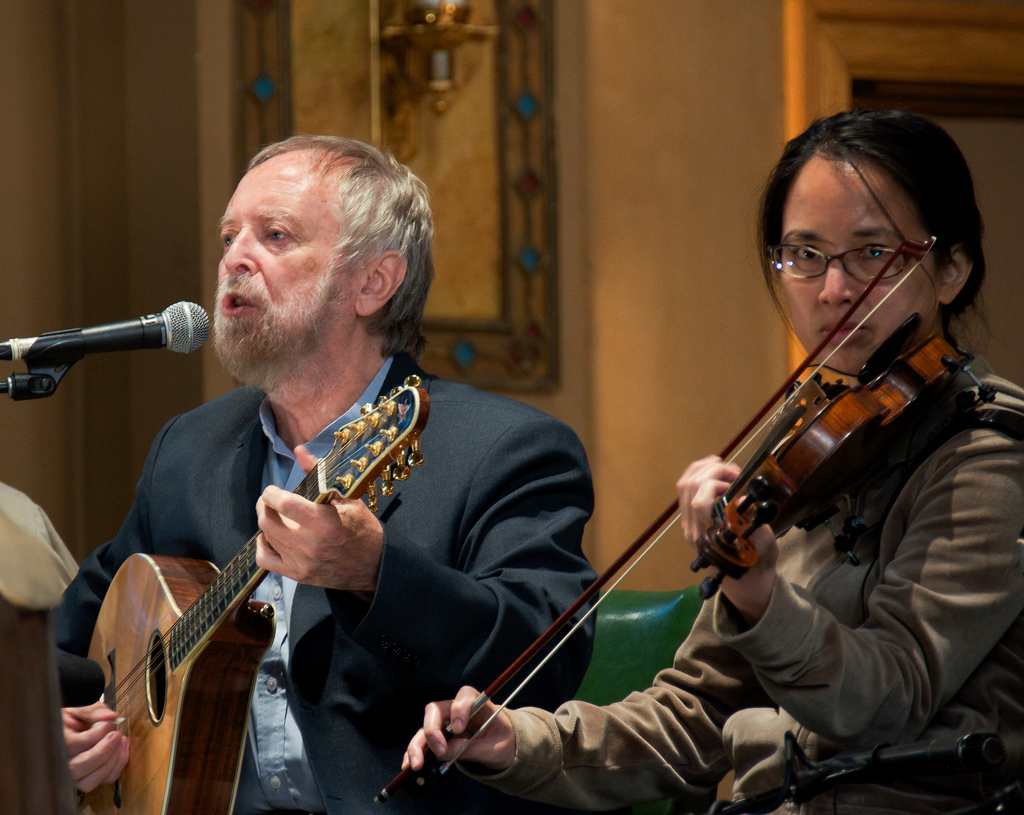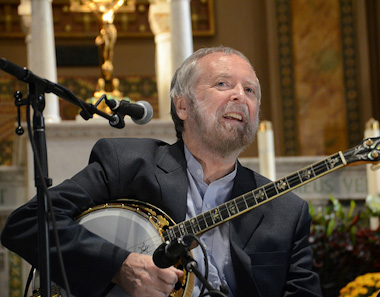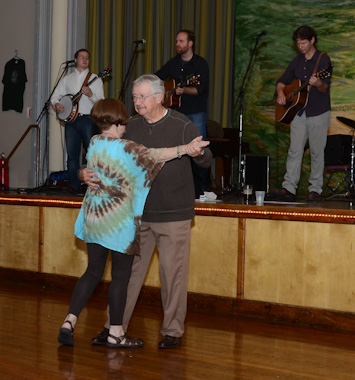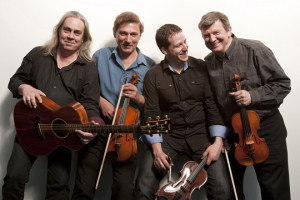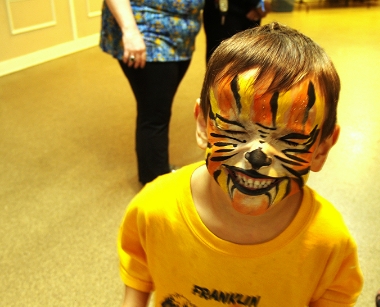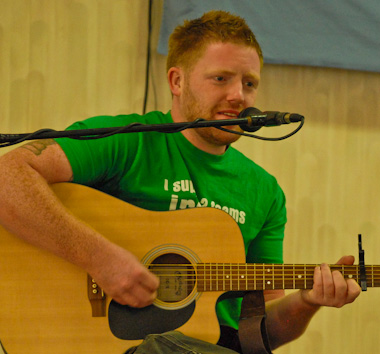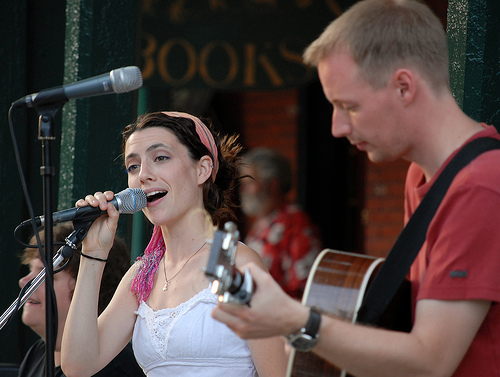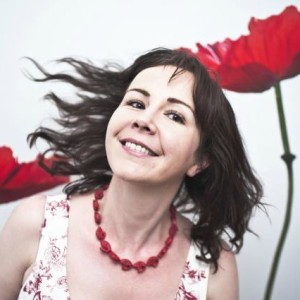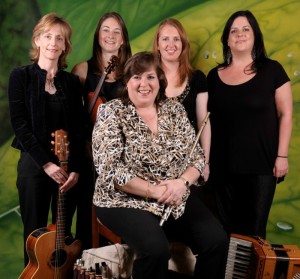
Joanie and CTL
She’s been described as “irrepressible,” “a force of nature.”
If you’ve seen Joanie Madden in concert, whether as the founder and leader of Cherish the Ladies, a gifted musical collaborator, or as a solo artist, you know it’s all true, and then some.
You’re not alone. In fact, some real heavy hitters also recognize the inexhaustible creativity of champion flute and whistle virtuoso Joanie Madden.
Let’s start with the United States Artists. In 2012, the nonprofit awarded Madden a $50,000 USA Artist Fellowship grant in recognition of her artistry. She’s the first Irish traditional musician to have been so honored.
In 2011, she was awarded the Ellis Island Medal of Honor, also because of her contributions to music and to Irish culture in the United States.
Madden, who will join Gabriel Donohue next Friday night for a largely informal Rambling House at the Philadelphia Ceili Group Festival, takes it all in stride. Not that she doesn’t feel honored, but she’s so busy doing the very thing that brought her to the attention of those prestigious institutions in the first place: playing her music, seemingly everywhere and all the time.
“I did have a great year, winning the USA Fellowship. That was a big one,” Madden says. “It’s great to have it, and it does make all the hard work worthwhile, but I’d be doing this whether I got the trophy or not.”
Thank goodness for that. Take a look at Madden’s recent musical resume, and it’s clear she has no intention of slowing down, or doing the things that keep the creative juices flowing.
Already a Grammy winner and featured on the final “Lord of the Rings” soundtrack, more recently she contributed to the soundtrack of the BBC America series “Copper.”
Madden has always been in demand as a collaborator on projects outside of her duties with Cherish the Ladies. In 2008, she was featured on the TV show and CD “Absolutely Irish,” which featured a who’s who of Irish musical talent, including Mick Moloney, Seamus Egan, John Doyle, Liz Carroll, and many more. In 2009 she performed on “Pride of New York,” a gem of an Irish traditional recording also featuring Brian Conway on fiddle, Brendan Dolan on keyboards, and accordionist Billy McComiskey.
Probably her most treasured recent collaboration was with her own father, button accordion player Joe Madden, on 2011’s inspiring “A Galway Afternoon.” Also on the CD: Madden’s brother John on drums, pianist Charlie Lennon .. and our own Gabriel Donohue on guitar.
“Galway Afternoon” was easily one of the best CD recordings of Irish that year, and possibly any year. It was another notable triumph.
Of course, what made the album so memorable was the playing of Joe Madden, who was essentially ambushed by his daughter and coaxed into recording, which is not something he ever wanted to do. And what made it so poignant was that Joe Madden’s gift was captured just a few months before he died following a fall in his home.
Madden still feels the loss, but she too is extremely pleased that she was able to capture such an amazing performance, sharing that particular honor with her reluctant dad. “I was just so thrilled that we got it. That’s why you live today and you grab today. He was very happy he made that album, without a doubt.”
With a force like Joe Madden around, it’s not surprising that the family’s Bronx home was a gathering place for many of the best Irish traditional musicians. Still, nothing could have prepared her for her remarkable career.
“When I started out as a musician, the only Irish band that was really making it was The Chieftains,” Madden recalls. “The last thing my parents wanted me to do was to go into the music, except on weekends. I never knew I’d be happy doing that. But I practiced day and night. I just loved it.”
The came a point where Madden knew what truly made her happy, and she made her decision. “I said to my father, ‘I’m going to travel and play my music around the world.’ He said, ‘You’re out of your mind.'”
Later on, of course, Joe Madden came around, she says. “He was just thrilled.”
Collaborations aside, no discussion of Joanie Madden would be complete without mention of Cherish the Ladies, one of the first and most inventive Irish traditional supergroups. Aft 27 years of touring and recording, it’s Cherish the Ladies that continues to dominate her life. Happily, of course.
“My first commitment is a hundred percent to the band,” Madden says.”We’re all great friends, even today. You’re on the road with these guys for so many years, you get to become great, great friends–even like sisters. They’re always there when you need them.”
Which brings us back to where we started. When you think about a Cherish the Ladies concert, there’s no getting past Madden’s incredible humor and her intuitive rapport with the audience. It probably seems like second nature … but it wasn’t always that way. “I got over my shyness on the stage. I realized somebody had to do it. I remember going to see a show with the “Cars,” and they didn’t say anything all night.”
It’s that legendary ebullience, along with her undeniable talents, that have made her who she is today. For that, Madden continues to be grateful, even when the going gets tough.
“Some of our travel days are just torture,” Madden admits. “You get off a plane, and then you have to drive two or three hours. But as soon as you get on the stage, the adrenaline kicks in. I mean, I’m able to out food in the table for blowing the penny whistle. Come on.”
Tickets are still on sale for the Philadelphia Ceili Group Festival. Details and schedule here.

